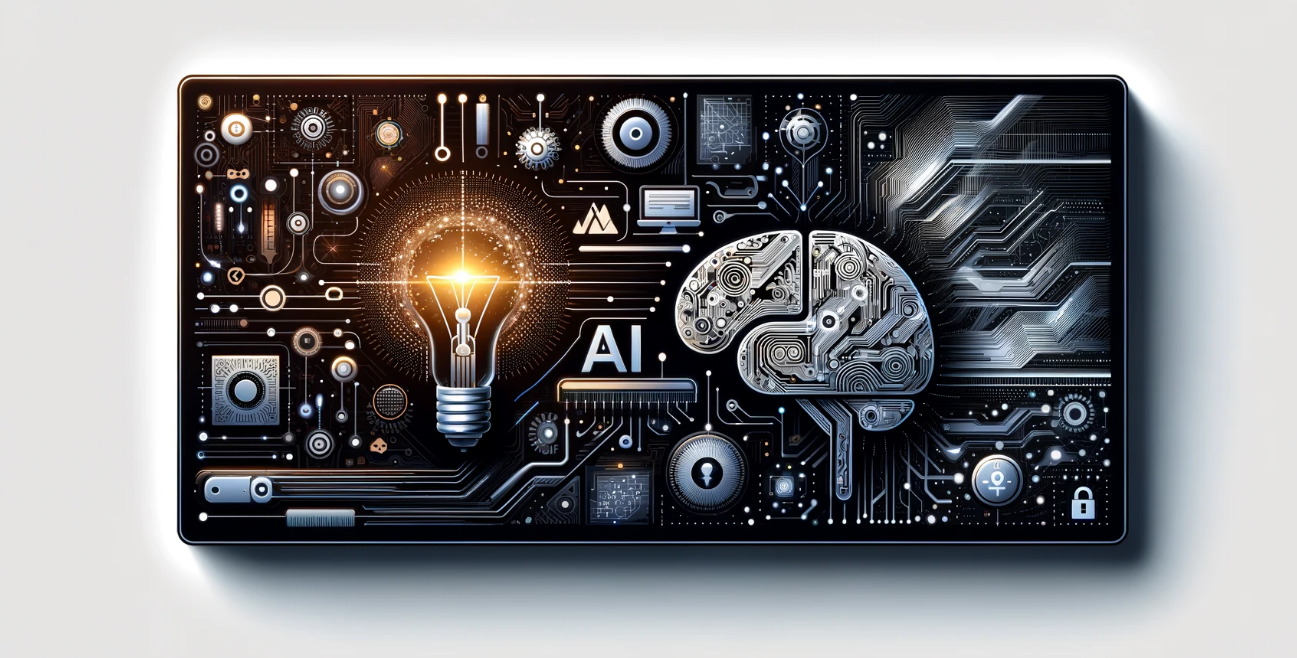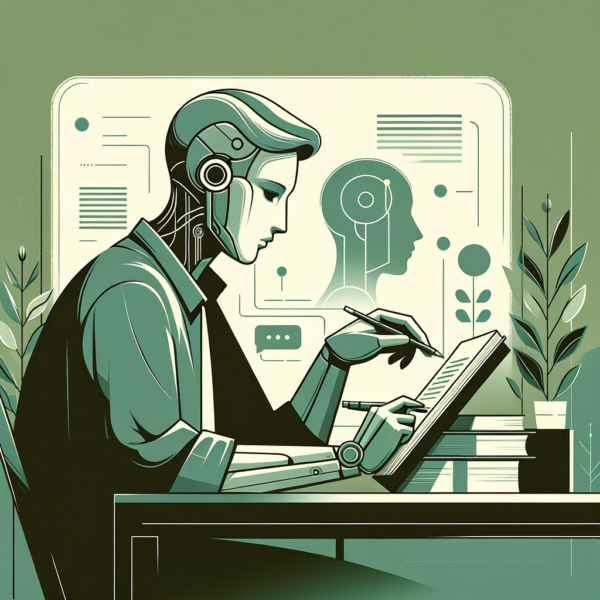The advent of Artificial Intelligence (AI) marks a revolutionary chapter in the digital era. It represents a fusion of advanced computing power, vast data, and innovative algorithms, reshaping how we interact with technology. This includes the benefits of AI in content creation, enhancing how content is developed and managed.
Initially confined to the realms of academic research and high-level computing, AI has now permeated virtually every aspect of our digital lives. From personalized product recommendations on e-commerce sites to the voice assistants in our smartphones, AI’s presence is ubiquitous and growing.
The core strength of AI lies in its ability to learn and adapt. Using techniques like machine learning and deep learning, AI systems can analyze large sets of data, recognize patterns, and make decisions with minimal human intervention.
This capability enables AI to perform a wide range of tasks – from simple ones like sorting emails to complex ones like predicting market trends. The digital era, powered by AI, is defined by this increased efficiency, precision, and personalization.
The Evolving Role of AI in Content Creation
In the domain of content creation, AI’s role has evolved from a supportive tool to a central player. Initially, AI was primarily used to gather and analyze data to inform content strategies. Now, it is actively involved in the creative process itself.
AI-driven tools can now generate written content, create graphic designs, and even produce music and videos. This transformation is not just about automation; it’s about augmenting human creativity.
AI in content creation signifies a shift from manual, time-consuming processes to more streamlined, efficient ones. It offers the ability to generate ideas, draft initial content outlines, and even fine-tune the final product.
For instance, AI-powered writing assistants can suggest improvements in grammar, style, and tone, making the content more engaging and effective.
Moreover, AI’s capability to analyze vast amounts of data enables content to be more targeted and relevant. By understanding audience preferences and behaviors, AI can assist in crafting content that resonates more deeply with its intended audience. This personalization is key in an age where capturing and retaining audience attention is paramount.
As AI continues to evolve, its impact on content creation is expected to deepen. It promises not only to enhance efficiency and creativity but also to redefine the very nature of how content is conceptualized and produced.
This journey of AI in content creation is a testament to the broader transformative potential of AI in the digital era.
Your Publishing Journey Awaits – Start Now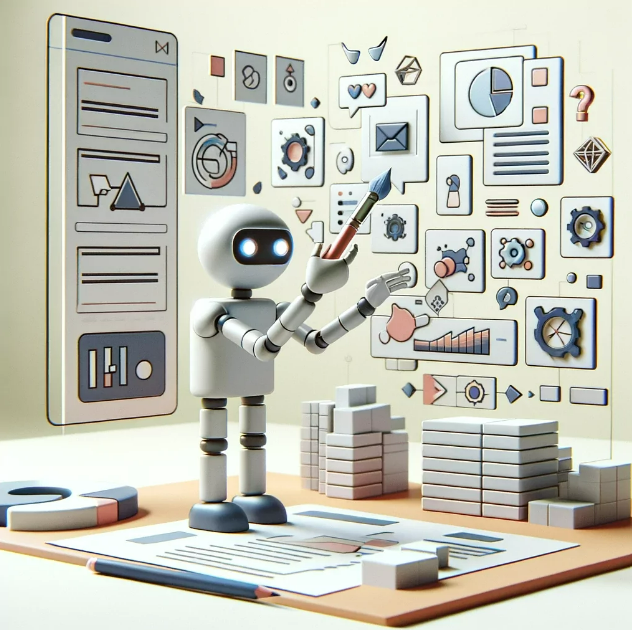
Benefits of AI in Content Creation
Time Efficiency: How AI Speeds Up the Content Creation Process
One of the most significant benefits of AI in content creation is the considerable time efficiency it offers. AI-powered tools can automate repetitive and time-consuming tasks like data collection, initial drafting, and basic editing.
This automation accelerates the content creation process, allowing creators to focus on more strategic and creative aspects of their work. For example, AI can quickly generate content ideas, draft blog post outlines, and even write standard news articles, significantly reducing the time from conception to publication.
This efficiency is invaluable in today’s fast-paced digital environment, where the ability to produce high-quality content quickly can be a major competitive advantage.
Enhanced Creativity: AI’s Role in Fostering Innovative Content Ideas
AI doesn’t just streamline content creation; it also enhances creativity. By analyzing existing content and trends, AI tools can suggest fresh, innovative ideas that might not be immediately obvious to human creators.
These suggestions can inspire creators to explore new topics, formats, or perspectives they might not have considered otherwise. Furthermore, AI can assist in the creative process by offering variations in writing styles, suggesting visual elements, or even composing music to accompany content. This collaborative synergy between human creativity and AI’s analytical capabilities leads to more diverse and engaging content.
Data-Driven Decisions: Utilizing AI for Analytics and Targeted Content
AI excels in handling and interpreting large datasets, making it an invaluable tool for data-driven decision-making in content creation. Through AI, creators can access insights into audience preferences, engagement metrics, and content performance.
This information enables creators to tailor their content more effectively to their target audience, ensuring that it resonates and achieves the desired impact. AI can also predict trends, helping creators stay ahead of the curve and produce relevant, timely content. By leveraging AI for analytics, content creators can make informed decisions that enhance the relevance and effectiveness of their content.
Cost Reduction: How AI Can Be a Cost-Effective Solution for Content Creators
Incorporating AI into the content creation process can lead to significant cost reductions. By automating routine tasks, AI reduces the need for extensive human labor, which can be a major expense in content production.
Additionally, the increased efficiency and speed provided by AI can reduce the time to market, further cutting costs. For small businesses or individual creators, AI tools offer a level of scalability that might not be feasible otherwise.
They can produce high-quality content without the need for large teams or expensive resources. In the long term, this can lead to a more sustainable and financially viable content creation model, making high-quality content creation accessible to a broader range of creators.
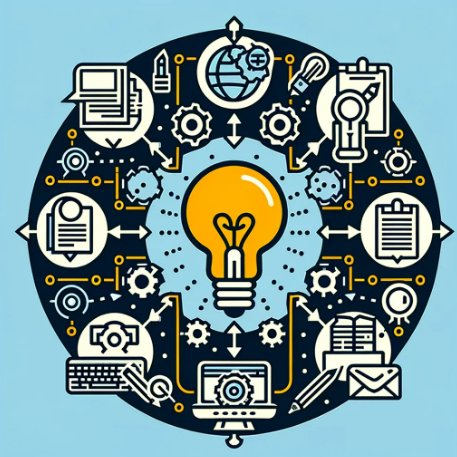
Step-by-Step Breakdown of AI-Generated Content: From Ideation to Publication
The integration of AI into the content creation process has redefined the journey from ideation to publication, making it more streamlined and effective. Here’s a step-by-step breakdown of this process:
- Ideation and Research: AI tools kickstart the process by generating content ideas based on trending topics, keywords, and audience preferences. They can also conduct extensive research in seconds, gathering relevant information and data to inform the content.
- Content Planning and Strategy: Utilizing insights from AI analytics, content creators can develop a more targeted strategy. AI can suggest the best formats, channels, and timelines for content based on audience engagement patterns and historical data.
- Drafting and Writing: AI-powered writing assistants aid in drafting content, offering suggestions for structure, style, and grammar. They can also generate basic content drafts, which creators can then refine and personalize.
- Editing and Optimization: AI tools assist in editing by checking for grammatical errors, readability, and SEO optimization. They can also suggest improvements to make the content more engaging and accessible.
- Visual and Multimedia Enhancements: AI can recommend or even create visual elements such as images, infographics, and videos that complement and enhance the textual content.
- Personalization and Localization: AI enables content to be tailored for different segments of the audience or adapted for various regions and languages, increasing its relevance and reach.
- Publication and Distribution: AI systems can automate the scheduling and posting of content across various platforms, optimizing the timing for maximum impact.
- Performance Analysis and Feedback: Post-publication, AI tools analyze content performance, providing feedback on engagement, reach, and audience response, which informs future content creation.
Collaboration between AI and Human Creativity
The most effective use of AI in content creation lies in its collaboration with human creativity. While AI provides efficiency, speed, and data-driven insights, the human element adds nuance, empathy, and a personal touch that AI cannot replicate.
The blend of AI’s analytical prowess with human creativity results in content that is not only efficient and targeted but also emotionally resonant and genuinely engaging. This synergy ensures that the content remains relatable and appealing to the audience while benefiting from the efficiency and precision of AI.
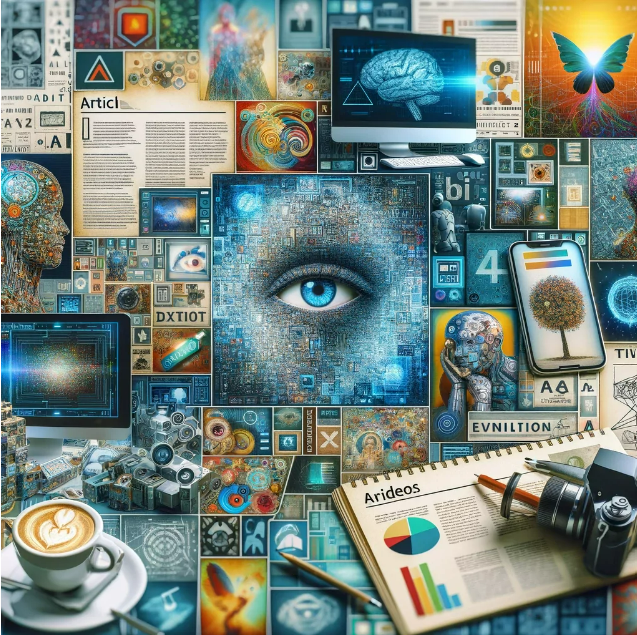
Types of AI-generated content: Articles, Videos, Images, etc.
AI-generated content represents a groundbreaking shift in how digital content is produced. This shift encompasses a wide range of formats:
- Articles and Written Content: AI algorithms can write articles, reports, and even creative stories. They analyze existing data and text to generate new content that aligns with the desired style and subject matter.
- Videos and Multimedia: AI tools are capable of creating short videos, and animations, and even assisting in the editing process. They can analyze visual trends and generate content that is visually appealing and engaging.
- Images and Graphic Design: AI can produce artwork and design elements, from basic graphics to complex creative illustrations. These tools understand design principles and can create visuals that complement textual content.
- Music and Audio: AI systems can compose music and audio tracks, offering a wide range of styles and moods to match different types of content.
- Personalized Content: AI excels in creating personalized content for individual users, such as personalized emails, product recommendations, and tailored news feeds.
Quality and Authenticity: Evaluating the Effectiveness of AI Content
The quality and authenticity of AI-generated content are crucial factors in its effectiveness. In terms of quality, AI has reached a level where it can produce content that is often indistinguishable from human-generated content in certain contexts.
However, the authenticity and originality of AI content can be a matter of concern. While AI is excellent at replicating styles and formats, it may struggle with creating truly original concepts and ideas. This challenge necessitates a careful evaluation of AI content, ensuring it meets standards of authenticity and adds genuine value to the audience.
Ethical Considerations: Addressing Concerns About Originality and Authenticity
The rise of AI-generated content brings several ethical considerations to the forefront. One major concern is the potential for AI to produce content that lacks originality or misrepresents facts, especially in journalism and academic writing. There’s also the risk of AI perpetuating biases present in its training data, leading to content that could be unfair or discriminatory.
To address these concerns, it’s important to maintain a transparent approach regarding the use of AI in content creation. Content creators should disclose when AI has been used and ensure that AI-generated content is reviewed and fact-checked by human editors. Additionally, ongoing efforts to improve AI algorithms to recognize and mitigate biases are crucial.
The Role of Natural Language Processing (NLP) in Content Creation
Natural Language Processing (NLP) is a subfield of AI that focuses on the interaction between computers and human language. It involves the application of algorithms to identify and extract the natural language rules, enabling computers to understand, interpret, and respond to human language in a valuable way.
NLP combines computational linguistics—rule-based modeling of human language—with statistical, machine learning, and deep learning models. These technologies enable the computer to process human language in the form of text or voice data and to ‘understand’ its full meaning, complete with the speaker’s or writer’s intent and sentiment.
NLP is crucial in AI for several reasons. Firstly, it bridges the human-computer interaction gap, allowing machines to engage in natural, human-like conversations. Secondly, it enables computers to analyze vast amounts of natural language data, extracting insights and aiding in decision-making processes.
In content creation, NLP is fundamental in automating and enhancing various tasks, such as content generation, summarization, and personalization.
How NLP is Transforming Content Creation
In content creation, NLP is transforming several key aspects:
- Automated Content Generation: NLP enables the creation of coherent and contextually relevant written content. From generating news articles to creating personalized email responses, NLP tools are making significant strides.
- Content Personalization: NLP algorithms can analyze user data to understand preferences and interests, allowing for the creation of highly targeted and personalized content.
- SEO Optimization: NLP tools assist in optimizing content for search engines, understanding and implementing keywords effectively to improve search rankings.
- Language Translation and Localization: NLP facilitates the translation and localization of content, making it accessible to a global audience. It can adapt content to different cultural and linguistic nuances, broadening its reach.
- Sentiment Analysis: NLP can analyze feedback and comments to gauge audience sentiment, providing insights into how content is being received and areas for improvement.
Future Prospects: What NLP Promises for the Future of Content Creation
The future of NLP in content creation is promising and holds potential for even more sophisticated applications:
- Improved Contextual Understanding: Future advancements in NLP aim to enhance the understanding of context and subtleties in human language, leading to more nuanced and sophisticated content creation.
- Enhanced Creativity and Originality: As NLP technologies evolve, they are expected to contribute more creatively, potentially generating original ideas and concepts for content.
- Seamless Multilingual Content Creation: Advancements in NLP will facilitate more seamless and accurate translation processes, making multilingual content creation more efficient and effective.
- Interactive and Dynamic Content: NLP may lead to the creation of more interactive and dynamic content that can adapt in real time based on user interactions and feedback.
- Ethical and Unbiased Content Creation: Future NLP tools will likely focus on ethical considerations, ensuring content is free from biases and respects privacy and ethical standards.
Challenges and Limitations of AI in Content Creation
While AI has significantly advanced in content creation, it still faces notable limitations, particularly in understanding context and nuance. AI algorithms, based on pattern recognition, can struggle to grasp the subtleties and complexities inherent in human language and expression.
This limitation becomes evident in tasks requiring a deep understanding of cultural nuances, idiomatic expressions, or contextual relevance. For instance, AI might generate content that is technically accurate but lacks the emotional depth or cultural sensitivity required for certain topics.
Additionally, AI may not effectively capture the intended tone or style, especially in creative writing or content aimed at evoking specific emotions.
Ethical and Legal Challenges in AI-Generated Content
AI-generated content also raises several ethical and legal challenges:
- Authorship and Originality: Determining the authorship of AI-generated content can be complex. Questions arise about the originality of content that is heavily derived from existing sources by AI algorithms.
- Intellectual Property Rights: The use of AI in content creation can lead to disputes over intellectual property rights. It’s often unclear who owns the rights to content created with the help of AI – the developer of the AI, the user, or the AI itself.
- Transparency and Disclosure: There’s an ethical imperative to disclose the use of AI in content creation, particularly in journalism and academic writing, to maintain transparency and trust.
- Data Privacy: AI systems require large datasets for training, which often include user data. This raises concerns about data privacy and the ethical use of personal information.
- Bias and Fairness: AI systems can inherit biases present in their training data, leading to biased content. Ensuring fairness and impartiality in AI-generated content is a significant challenge.
The Balance Between AI and Human Input in Content Creation
Finding the right balance between AI and human input is crucial in content creation. While AI can enhance efficiency and provide valuable insights, human oversight is essential to ensure quality, creativity, and ethical standards.
Human creators bring an understanding of context, culture, and emotional depth that AI currently cannot replicate. They can evaluate the appropriateness of content, ensure it aligns with ethical standards, and provide the creative spark that makes content engaging and relatable.
This balance involves leveraging AI for what it does best—handling large data sets, automating repetitive tasks, and generating initial content drafts—while relying on human expertise for strategic decision-making, creative input, and ethical considerations.
The future of content creation lies in a symbiotic relationship where AI enhances human creativity and efficiency, rather than replacing it.
Your Publishing Journey Awaits – Start NowEmbracing the Future: Concluding Thoughts on AI in Content Creation
The integration of AI into content creation marks a significant shift in the digital landscape, offering remarkable efficiencies and novel capabilities. From automating routine tasks to generating creative and personalized content, AI has proven to be a powerful tool in the content creator’s arsenal.
However, this advancement is not without its challenges. The limitations of AI in understanding complex human contexts and nuances, along with ethical and legal concerns, necessitate a careful and balanced approach.
As we move forward, the continual evolution of AI promises even greater possibilities, reshaping the way we create, consume, and interact with content. Embracing this future requires us to be adaptable, thoughtful, and innovative, blending the best of technology with the unique qualities that make us human.
